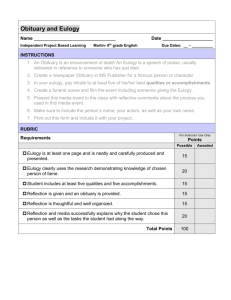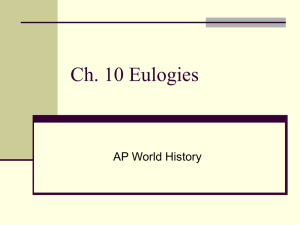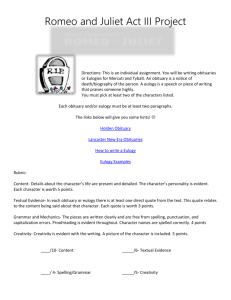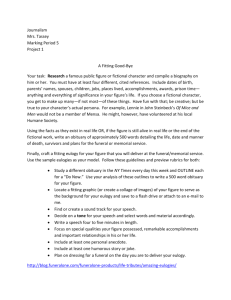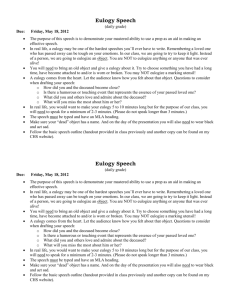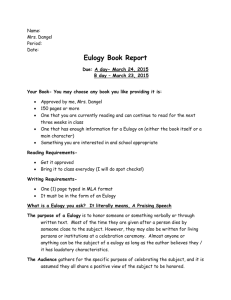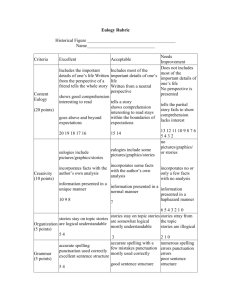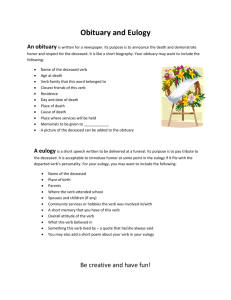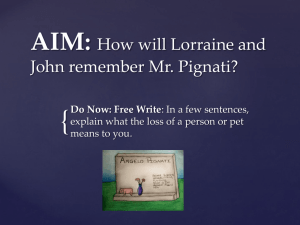Writing a eulogy
advertisement
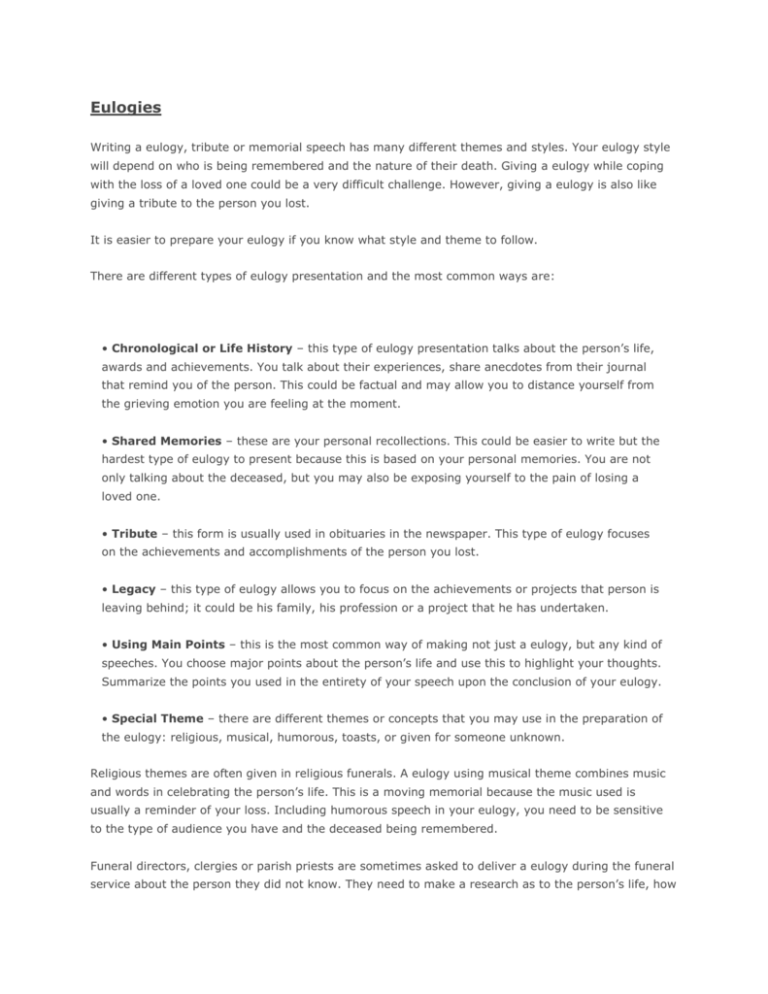
Eulogies Writing a eulogy, tribute or memorial speech has many different themes and styles. Your eulogy style will depend on who is being remembered and the nature of their death. Giving a eulogy while coping with the loss of a loved one could be a very difficult challenge. However, giving a eulogy is also like giving a tribute to the person you lost. It is easier to prepare your eulogy if you know what style and theme to follow. There are different types of eulogy presentation and the most common ways are: • Chronological or Life History – this type of eulogy presentation talks about the person’s life, awards and achievements. You talk about their experiences, share anecdotes from their journal that remind you of the person. This could be factual and may allow you to distance yourself from the grieving emotion you are feeling at the moment. • Shared Memories – these are your personal recollections. This could be easier to write but the hardest type of eulogy to present because this is based on your personal memories. You are not only talking about the deceased, but you may also be exposing yourself to the pain of losing a loved one. • Tribute – this form is usually used in obituaries in the newspaper. This type of eulogy focuses on the achievements and accomplishments of the person you lost. • Legacy – this type of eulogy allows you to focus on the achievements or projects that person is leaving behind; it could be his family, his profession or a project that he has undertaken. • Using Main Points – this is the most common way of making not just a eulogy, but any kind of speeches. You choose major points about the person’s life and use this to highlight your thoughts. Summarize the points you used in the entirety of your speech upon the conclusion of your eulogy. • Special Theme – there are different themes or concepts that you may use in the preparation of the eulogy: religious, musical, humorous, toasts, or given for someone unknown. Religious themes are often given in religious funerals. A eulogy using musical theme combines music and words in celebrating the person’s life. This is a moving memorial because the music used is usually a reminder of your loss. Including humorous speech in your eulogy, you need to be sensitive to the type of audience you have and the deceased being remembered. Funeral directors, clergies or parish priests are sometimes asked to deliver a eulogy during the funeral service about the person they did not know. They need to make a research as to the person’s life, how they died, and their achievements and about their family. Giving a toast during a funeral service is remembering the deceased in a brief and inspiring way. No matter what type of theme or style you use, the purpose of giving a eulogy is sharing a person’s life in one single speech. It is important to touch upon the life and the after life of the deceased. Involve your audience emotionally. Don’t worry if you need to shed tears during your delivery, it is likely that everybody listening were crying too. How To Write A Eulogy A eulogy is a well-crafted speech, which a person is designated to prepare and deliver during a funeral ceremony. It is usually read to commemorate a dearly departed - to celebrate the life spent here on earth and the memories that go with him. It is not necessary that a eulogy be a detailed summary of how the deceased person spent his life, but rather it can concentrate on particular positive situations or circumstances. Generally, people who are requested to deliver eulogies are those people who are considered to know best the deceased person. Therefore, personal experiences are expected to be retold and reminisced, and to be shared with other people who will be listening. The person delivering the eulogy must show the reasons why the deceased is well-loved and will be missed by the people around him. To be given the task of delivering a eulogy is really an honor hence the responsibility of providing a clear and positive picture of the person you will be talking about is in order. Eulogies may be written in various ways. Some people come up with serious speeches honoring the deceased person while others would rather show the humorous side of the deceased person. The most recommended eulogy is a combination of both since death should not be a reason to be sad but a celebration of a life well-lived. Appropriate humorous anecdotes may be interjected to lighten up the feeling of the audience. It is wise to develop a theme to give focus on your speech. You may choose to concentrate on a particular aspect of life of the deceased. Examples are: Family: If you are a family member, you can talk about how wonderful that person was as part of the family (a good mother, father, grandparent, etc) Friends: If you were best friends since high school or college, then talk about the good times you had and how he helped you during those years. Job-related: how great he performed his job, his dedication to doing his work and his ambition to do well in his chosen career. How To Write Your Own Eulogy Start by making an outline for your own eulogy writing. There is a lot to decide before starting to write your eulogy. First, determine if you want your eulogy to be written in the first person or third person. Using either “I” or “your name” will give you the right tone to continue your writing. Second, determine what you want to say in your funeral speech. Should it be a farewell speech, a preaching speech or just to recall your life. Third, determine which points you want to emphasize in your eulogy. Is it your hardships, your triumphs or just how your childhood was? Fourth, determine which part of your life becomes a blooper. Those funny moments could lighten the mood at your funeral. Fifth, Be sure to make your eulogy optimistic. Being positive will give your family and friends a lighter load at your passing. Remember that your death is sensitive to them. From “Different Eulogy Writing Styles” 2006-2008 http://www.eulogyspeech.net/eulogy-writing/Different-Eulogy-Writing-Themes-Styles.shtml Sample Eulogy for a Grandmother To tell you the truth I had a hard time putting all my granny’s good traits into writing. No matter how hard I try, I can never do justice to what she overcame in her lifetime. I know we are all grieving today for we all lost a great lady. But I know wherever she is now she’s happy and contented with what she left us. She was a mother, a sister and a friend to all of us. I’m sure each and every one of you here today has something to share on how my grandmother touched your life. She shared a lot of good memories, especially with me, her favorite grandchild. We shared lots of things together and she was one of my favorite mentors. I don’t know if I can still be the same person I was now that she’s gone. I can remember the last activity we did together; we went out to watch a movie. As some of you already know my grandmother really loved to watch classic love stories. Although we never agreed on what to watch, I always enjoyed our times together. She’d always ask odd questions about the actors or about the story. And I’d just laugh at her and she’d keep on asking until she got the answer she wanted. My granny was a very strong woman and she always got her way. Maybe that’s one quality I got from her. She was also a very good adviser. I personally would seek her advice before I’d go to my parents. We always had short talks. Even if I didn’t finish what I wanted to ask her she already had an answer for it. She was also the kind of person that would think about other people before herself. She never liked asking for help but she was always ready to lend a helping hand to others. She would do everything in her power to help other people. Although she never got the chance, I think in her own way she was able to show us how important we all were to her. We may no longer see her but we’ll always have these special moments we shared with her. She will always have a special part in our hearts. Let’s just be thankful that we knew a special lady like my grandmother. http://www.eulogyspeech.net/sample-eulogy/Grandmother-Eulogy-Sample.shtml
